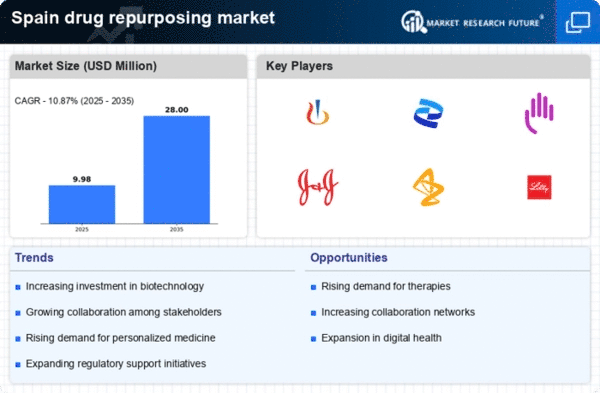The drug repurposing market in Spain is characterized by a dynamic competitive landscape, driven by the increasing need for cost-effective therapeutic solutions and the growing emphasis on innovation. Major players such as Novartis (CH), Pfizer (US), and AstraZeneca (GB) are actively engaged in strategic initiatives that enhance their market positioning. Novartis (CH) focuses on leveraging its extensive research capabilities to identify new applications for existing drugs, thereby streamlining the development process and reducing time to market. Pfizer (US) has adopted a strategy centered on partnerships with academic institutions to foster innovation in drug repurposing, while AstraZeneca (GB) emphasizes digital transformation to optimize its research and development processes, enhancing efficiency and effectiveness in drug discovery.
The competitive structure of the market appears moderately fragmented, with several key players exerting influence over various therapeutic areas. Companies are increasingly localizing manufacturing and optimizing supply chains to enhance responsiveness to market demands. This localized approach not only reduces operational costs but also aligns with regulatory requirements, thereby strengthening their competitive edge. The collective influence of these major players shapes a landscape where innovation and strategic collaborations are paramount.
In October 2025, Novartis (CH) announced a collaboration with a leading Spanish research institution to explore the repurposing of existing oncology drugs for new indications. This strategic move is likely to enhance Novartis's portfolio and accelerate the development of novel therapies, reflecting a commitment to innovation and patient-centric solutions. Such collaborations may also facilitate access to local expertise and resources, further solidifying Novartis's position in the market.
In September 2025, Pfizer (US) launched a new initiative aimed at repurposing its existing antiviral portfolio for the treatment of chronic diseases. This initiative underscores Pfizer's strategic focus on maximizing the utility of its drug pipeline, potentially leading to significant advancements in therapeutic options for patients. By repurposing established drugs, Pfizer not only mitigates development risks but also capitalizes on its existing market presence.
In August 2025, AstraZeneca (GB) unveiled a digital platform designed to streamline the drug repurposing process, enabling researchers to access a wealth of data and insights. This platform is expected to enhance collaboration among stakeholders and accelerate the identification of new therapeutic uses for existing drugs. AstraZeneca's investment in digital solutions reflects a broader trend towards integrating technology into drug development, which may redefine competitive dynamics in the market.
As of November 2025, current trends in the drug repurposing market are increasingly defined by digitalization, sustainability, and the integration of artificial intelligence (AI) in research processes. Strategic alliances among key players are shaping the competitive landscape, fostering innovation and enhancing operational efficiencies. Looking ahead, competitive differentiation is likely to evolve from traditional price-based competition towards a focus on innovation, technological advancements, and supply chain reliability. This shift may ultimately lead to a more sustainable and resilient market, where the ability to adapt and innovate becomes the cornerstone of success.

















Leave a Comment